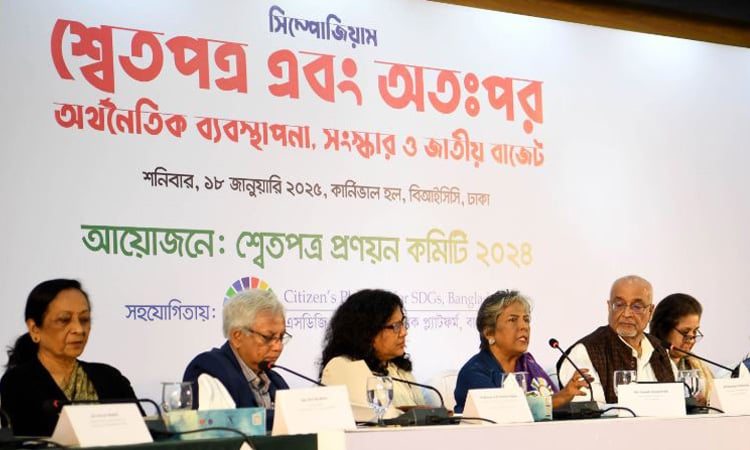News Flash
News Flash

DHAKA, Jan 18, 2025 (BSS) - Social Welfare Advisor Sharmin S. Murshid today said bringing order in bureaucracy and ensuring good governance is a key challenge for the interim government.
“There is changeover of political government but bureaucrats always stay. We need to think about how to bring discipline in bureaucracy and ensure good governance. This is a challenge for us,” she said.
The adviser was addressing the Session-3 (Medium term outlook and plan) of a symposium on "White Paper and Thereafter: Economic Management, Reforms and National Budget" as a guest of honour. White Paper Committee 2024 organised the session in collaboration with Citizen's Platform for SDGs, Bangladesh at BICC in the capital.
Moderated by Chair of White Paper Committee 2024 and Distinguished Fellow of the Centre for Policy Dialogue (CPD) Dr. Debapriya Bhattacharya, Principal Coordinator for SDG of Chief Adviser’s Office Lamiya Morshed also spoke on the occasion as a guest of honour.
Sharmin S. Murshid pointed out the critical role of the social welfare ministry in distributing allowances and benefits.
“The allowances in the social welfare ministry are very important, but there are so many ghosts of corruption within these systems. I realized this after taking charge of the ministry,” she said.
“In such a situation, I couldn't decide whether to keep or cancel these allowances. I had to continue the allowances and go through a proper process,” she said, adding, it is crucial to bring transparency to the internal processes of providing allowances to beneficiaries.
The adviser emphasized her plan to implement three key mechanisms within her ministry to ensure transparency and accountability- quality control, monitoring, and evaluation.
“I don't know when these mechanisms will be implemented at the national level, but I am committed to implementing these within the two ministries under my responsibility,” Murshid added.
She also highlighted the lack of planning in her ministries, where large-scale projects worth Taka hundreds of crores were being carried out without any clear strategy.
“Since assumed office, I have found that when I asked for project reports or plans, ministry officials were unable to provide them,” she said.
Morshed expressed concern over the lack of professionalism within the ministry. “Another issue I faced was the shortage of professionalism within the ministry”, she said.
The officials assigned to various tasks were often not experts in those fields, she said adding there were no effective coordination between the ministry and the public administration.
“I faced another harsh reality — there is no coordination between the public administration and the Ministry of Social Welfare. I have not seen any willingness within the public administration to foster this coordination. For example, when I was preparing someone for a specific task, they were suddenly transferred elsewhere,” she added.
Former Director General of Bangladesh Institute of Development Studies (BIDS) Dr KAS Murshid, Former Secretary to Statistics Division Riti Ibrahim, Deputy Resident Representative of UNDP, Bangladesh Sonali Dayaratne, Country Director of Asian Development Bank (ADB) Hoe Yun Jeong, CPB General Secretary Ruhin Hossain Prince and Adviser to the Chakma Circle Chief and Human Rights Defender Rani Yan Yan addressed as distinguished commentators.
CPD Senior Research Fellow Towfiqul Islam Khan, UCSI University Bangladesh Branch Deputy Vice-Chancellor Prof. A K Enamul Haque, Executive Director of BRAC Institute of Governance and Development (BIGD) Dr Imran Matin and Jahangirnagar University Prof. Sharmind Neelormi made separate power-point presentations on the occasion.